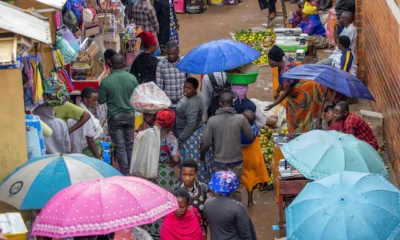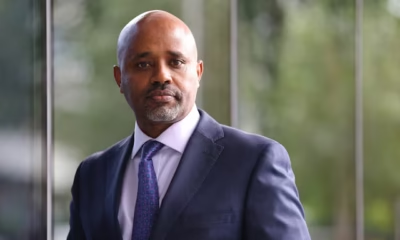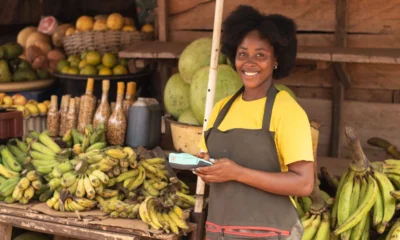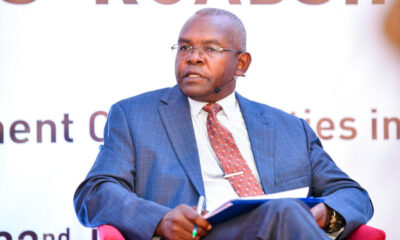Fintech & Mobile Money
Kenya Weighs Safaricom Split as Board Awaits Government Move
Treasury Secretary John Mbadi has hinted at carving up Safaricom or selling part of the government’s 35% stake. Such a shift would mark the biggest restructuring in Kenya’s telecom sector in decades. CEO Peter Ndegwa says the board awaits clarity before any steps are taken.

Kenya is considering splitting Safaricom into telecom, M-Pesa, and tower units. CEO Peter Ndegwa says the board hasn’t been engaged on the proposal yet.
Kenya Yet to Engage Safaricom Board on Splitting Firm, CEO Says
Kenya’s government has not yet opened formal discussions with Safaricom Plc about a potential plan to split the company into separate units, according to Chief Executive Officer Peter Ndegwa.
The remarks come after Treasury Secretary John Mbadi said last month that the state— which owns a 35% stake in Safaricom— is weighing options to raise revenue. These include breaking up the company into three parts: its telecoms business, the mobile-money service M-Pesa, and a tower operator, or alternatively offloading part of its stake.
“There hasn’t been any engagement with the board yet,” Ndegwa told journalists in Nairobi, emphasizing that the company continues to run as a single entity.
Government Eyes New Revenue Streams
Mbadi’s comments highlighted the pressure the government faces to boost revenues amid rising debt repayments and widening fiscal gaps. He suggested that splitting or partially privatizing Safaricom could unlock fresh resources for the exchequer.
Safaricom is not only Kenya’s most valuable listed firm but also a crucial source of government dividends. Any structural changes would have major implications for investors, regulators, and millions of customers.
M-Pesa at the Center of the Debate
Analysts say the M-Pesa platform, which dominates Kenya’s mobile-money market, is likely the most attractive unit if a split occurs. The service processes nearly half of Kenya’s GDP annually through mobile transactions, making it a key driver of financial inclusion and government tax receipts.
Separating M-Pesa into a standalone business could allow more direct regulation by the Central Bank of Kenya, which has previously voiced concerns over systemic risks linked to its size.
Safaricom’s Regional Footprint
Beyond Kenya, Safaricom has also expanded into Ethiopia, where it launched mobile services in 2022 and already counts millions of subscribers. Analysts believe this regional growth makes the company a strategic asset not just for Kenya but for East Africa as a whole.
A breakup could complicate Safaricom’s regional ambitions by fragmenting decision-making and slowing expansion plans.
What Happens Next?
For now, Safaricom’s board and management remain uninvolved in the government’s deliberations. Market watchers expect any concrete proposal to face scrutiny from regulators, Parliament, and investors at the Nairobi Securities Exchange.
Despite the uncertainty, Ndegwa struck a measured tone. “Our focus remains on serving customers and creating value for shareholders,” he said.
Whether Kenya chooses to split, sell, or keep its stake in Safaricom, the decision will shape the future of the country’s largest corporate taxpayer and its role in the wider African digital economy.
Fintech & Mobile Money
Uganda Hits 34.6M Mobile Money Users, Overtakes Bank Accounts in 2025
For the first time in history, mobile money in Uganda has overtaken the banking sector in customer reach. The shift reflects growing trust in digital finance amid economic pressures. It also highlights challenges for banks that must innovate to stay relevant.

As of June 2025, Uganda reported 34.6 million mobile money users, outnumbering 24 million bank accounts. The shift marks a tipping point in digital finance and inclusion.
Uganda’s Mobile Money Users Now Outnumber Bank Accounts
Kampala, Uganda — September 24, 2025 — Uganda has crossed a major milestone in its financial development: the country now boasts 34.6 million active mobile money subscribers, overtaking 24 million bank accounts. According to Monitor, this surge reinforces mobile money’s role as the backbone of Uganda’s path toward universal financial inclusion. (Monitor)
The shift signals more than just numbers: it reflects how everyday Ugandans are choosing wallets over branches. For many, smartphones or basic phones are their primary link to financial services, not bank doors. This follows a similar trajectory as witnessed in Kenya’s mobile money revolution spearheaded by M-Pesa.
How Mobile Money Broke Through
Mobile money started in Uganda as a way to send cash between phones. Over the years, it evolved into a platform for bill payments, merchant transactions, and microloans. Telecom providers like MTN Uganda and Airtel have been central to this growth, partnering closely with fintechs to build robust wallet systems.
The regulatory environment has kept pace. Under the National Payments Act, the Bank of Uganda has licensed dozens of mobile payment providers, pushing for interoperability and user protection. These steps help build trust and expand usage.
In rural areas, mobile money often replaces the need for a branch. A small village shop can become a financial hub via an agent. Residents can transfer money, pay utility bills, or receive funds without venturing into town.
These transformations mirror patterns across Africa. Statista notes that in low-income countries, mobile money accounts are now outpacing traditional bank accounts. Uganda’s case is a strong local example of that trend. (Statista)
Pressure Mounts on Traditional Banking
Banks in Uganda now face a real test: adapt or be left behind. Many are scrambling to build digital platforms, APIs, and partnerships with mobile money providers to retain relevance. Some are blending bank accounts with mobile wallets, allowing users to move funds seamlessly between the two.
Yet, legacy systems, regulatory inertia, and infrastructure constraints slow progress. Banks must transform quickly or risk losing consumers to more agile digital-only players.
Risks, Security, and Regulation
Mass adoption brings greater scrutiny around safety and regulation. A recent paper examines the #StopAirtelThefty social media movement, in which users accused mobile money platforms of lapses in security that allowed unauthorized access. That episode underscores the need for stronger fraud, identity, and technical controls. (arXiv Paper)
The central bank has responded with tighter oversight, mandating standards on cybersecurity, transaction limits, and complaint mechanisms. These regulations aim to protect users without stifling innovation.
For users, the tradeoff is between convenience and trust. While mobile money is ideal for everyday transfers, many still prefer banks for larger transactions, savings, or credit access.
Economic & Social Impacts
With mobile money now dominant, the broader economy feels the ripple effects. Financial inclusion jumps when people who were previously “unbanked” now hold digital wallets. This enables them to save, transact, and build financial histories.
Transaction data generated through mobile wallets becomes a valuable asset. Lenders can use it to assess creditworthiness for microloans, bridging gaps in traditional credit underwriting.
Costs per transaction drop. Operating thousands of agents is cheaper than hundreds of bank branches. That reduction helps providers serve lower-income, remote users profitably.
Moreover, the government can better trace flows of money, manage liquidity, and curb the informal cash economy.
Still, the system must avoid overreliance on any single player. Regulators must keep competition healthy so telcos or fintech giants don’t dominate unfairly.
Key Figures & Trends
- 34.6 million mobile money users vs 24 million bank accounts as of June 2025.
- In the year to June 2024, Monitor reports over Shs 253.7 trillion transacted via mobile wallets—up from Shs 192.9 trillion previously.
- Uganda is now ranked among the fastest-growing mobile money markets in Sub-Saharan Africa. (Monitor)
Outlook & Challenges
The trajectory seems set: mobile money will continue its ascendancy. The next phase will see hybrid models, where banks, telcos, and fintechs collaborate to offer seamless financial service suites.
Yet challenges remain. Network stability, agent liquidity, fraud risks, and regulatory consistency all require ongoing attention. Providers must invest in education, security, and user experience to retain trust.
Banks that pivot smartly will survive and even thrive—offering credit, insurance, and long-term financial products to mobile-first customers. The winners will be those who see mobile money not as disruption, but as the platform for future banking.
Fintech & Mobile Money
Kenya High Court Ruling on TechnoService vs Microsoft
On September 16, 2025, a Nairobi court ruled that affidavits from senior executives like Nderitu need not face cross-examination without exceptional grounds. This decision strengthens Microsoft’s defense in the ongoing case. Critics argue it tilts the scales against smaller Kenyan companies.

On Sept 16, 2025, Kenya’s High Court dismissed TechnoService’s bid to cross-examine ex-Microsoft boss Kendi Nderitu, shaping corporate justice in Africa.
Kenya High Court Ruling on TechnoService vs Microsoft Case Blocks Cross-Examination of Ex-Executive
Nairobi, 16 September 2025 — The Kenya High Court has dismissed a high-profile application by TechnoService Limited seeking to cross-examine former Microsoft East Africa Country Manager, Kendi Nderitu, in a long-running commercial dispute with Microsoft Corporation and its global affiliates. The judgment, delivered on Tuesday, signals yet another turning point in a case that has drawn significant attention within East Africa’s technology and legal ecosystems.
According to reporting by Kenyan Wall Street, the ruling effectively shuts down TechnoService’s efforts to directly question the former executive under oath.A Kenyan court last year October, declined to intervene in arbitration proceedings that were ongoing between the two warring corporates, arguing that courts must respect the parties’ mutual decision to settle disputes via arbitration. The local firm had argued that cross-examination was necessary to test the credibility of Nderitu’s sworn affidavit, which forms part of Microsoft’s defense.
A Long-Running Legal Battle
The dispute traces back to contracts signed between TechnoService and Microsoft that reportedly broke down over alleged breaches of distribution and licensing agreements. While court filings remain largely sealed, TechnoService claims it suffered significant financial losses due to Microsoft’s alleged failure to honor parts of the deal.
Legal scholars note that corporate battles between local firms and multinational tech giants are not new. A World Bank study on digital markets emphasizes how power imbalances often play out in emerging economies, where local firms struggle to match the legal and financial muscle of global corporations.
By attempting to cross-examine Nderitu, TechnoService was effectively testing the judiciary’s willingness to give smaller firms more latitude when challenging international corporations in Kenyan courts.
Why the Court Said No
In her ruling, the presiding High Court judge stressed that affidavits filed by senior executives can be relied upon without subjecting them to cross-examination unless “exceptional circumstances” are proven. The court determined that TechnoService had not demonstrated such circumstances.
Legal analysts interpret this as a reaffirmation of procedural safeguards in Kenya’s judicial system. As Kenya Law explains, affidavits are binding unless material contradictions are shown — a high bar for litigants.
“This decision underscores the balance courts must strike between fair trial rights and efficiency in commercial litigation,” said Nairobi-based advocate Caroline Mwangi in an interview. “If every affidavit from corporate executives required cross-examination, cases involving multinational corporations would grind to a halt.”
Broader Implications for Tech Governance
The ruling resonates beyond the courtroom. With Nairobi increasingly seen as Africa’s Silicon Savannah, disputes between global tech firms and local partners have implications for investment flows, competition policy, and innovation ecosystems.
Multinationals such as Microsoft, Google, and Amazon continue to expand aggressively across Africa, investing in data centers, AI research, and cloud services. According to Bloomberg, Africa’s digital economy is projected to grow to $180 billion by 2025, up from $115 billion in 2020. Legal certainty, therefore, becomes central to attracting and sustaining this investment.
By rejecting TechnoService’s request, the High Court may reassure foreign investors that Kenya’s judiciary will guard against what they may perceive as “delay tactics.” On the other hand, critics argue that this undermines smaller local firms who already face steep barriers when negotiating contracts with global corporations.
The Question of Judicial Independence
The case also highlights the ongoing debate over judicial independence in Kenya. Although the Constitution of Kenya guarantees an impartial judiciary, local firms often voice concerns that multinational corporations wield disproportionate influence due to their economic clout.
Groups such as Transparency International have warned that corporate litigation involving powerful global players can test the robustness of Kenya’s legal safeguards. For TechnoService, the ruling could reinforce the perception that smaller companies rarely prevail when facing global giants.
What Happens Next?
TechnoService’s lawyers have hinted at appealing the decision to Kenya’s Court of Appeal, arguing that the refusal undermines their client’s right to a fair hearing. Should the case proceed, it will likely be closely monitored by legal experts, investors, and policymakers both locally and internationally.
Meanwhile, Microsoft maintains its stance that it has acted lawfully and in accordance with contractual obligations. The company has not issued fresh public statements on the matter, though past filings suggest it views the litigation as “frivolous and without merit.”
Interpretative Lens: Why This Matters
From an interpretative perspective, this ruling is more than just a procedural outcome in a commercial case. It reflects the broader tension between global corporate power and local economic sovereignty.
If Kenyan courts consistently side with global corporations, local innovators may become hesitant to partner with them for fear of legal vulnerability. Conversely, if courts lean too heavily toward local firms, multinational players may scale back their investment, slowing Kenya’s ambition to be a continental digital hub.
The High Court ruling, therefore, is a microcosm of the delicate balancing act facing many African economies as they integrate into global digital supply chains.
Conclusion
On 16 September 2025, the Kenya High Court ruling on TechnoService vs Microsoft case marked another twist in a dispute that reflects the wider dynamics of globalization, judicial independence, and the power struggles defining Africa’s digital transformation.
Whether through appeals, settlements, or policy reforms, the eventual resolution will help determine not just the fate of TechnoService, but also the confidence of local firms navigating the increasingly complex world of global technology partnerships.
Fintech & Mobile Money
Kenya Considers Splitting Safaricom Units
Safaricom’s
mobile-payments platform M-Pesa could become a separate entity under a new government plan. Treasury Secretary John Mbadi says the split could bring huge benefits to the state. Investors are watching closely for potential impacts on the market.

Kenya may split Safaricom into telecom, tower, and M-Pesa units. Government seeks efficiency and potential stake reduction.
Kenya Explores Safaricom Breakup
Kenya’s government is evaluating a potential split of Safaricom Plc, the nation’s largest listed company, into three distinct units. The plan could also involve reducing the state’s 35% stake in the mobile-phone operator.
Three Units on the Table
Treasury Secretary John Mbadi revealed in Nairobi that the proposed restructuring would create a telecommunications company, a tower operator, and a separate mobile payments platform, M-Pesa. Mbadi described the assessment as showing “a huge benefit” to the government if the company is divided.
Government Stake and Cabinet Approval
While discussions are ongoing, a final decision on splitting Safaricom and reducing the state’s stake has not yet been finalized. Any action would require formal approval by the Cabinet, and the government is weighing both financial and operational advantages.
In neighbouring Uganda, Mtn, the country’s leading telcom company announced plans to spin off its mobile money unit into a standalone fintech firm.
Efficiency and Market Impact
Analysts say the move could streamline Safaricom’s operations and unlock value in the distinct business units. By separating the mobile-money platform from the telecommunications infrastructure, the government hopes to enhance market efficiency and attract further investment.
A Historical Perspective
Safaricom, renowned for pioneering M-Pesa, has been a transformative force in Kenya’s digital economy. The platform has not only expanded financial inclusion but also made Kenya a global leader in mobile payments. The proposed restructuring signals a potential shift in how the company aligns its services and investment priorities.
Investor and Market Reactions
Global and local investors are closely monitoring developments, particularly regarding the impact on share value and the future of M-Pesa. Any reduction of the government’s stake could influence foreign investor confidence while reshaping the competitive landscape of East Africa’s telecom market.
-

 Public Finance & Economic Development5 days ago
Public Finance & Economic Development5 days agoUganda’s Debt Surge 2025: Domestic Borrowing and Economic Impact
-

 Banking, Finance & Economic Policy6 days ago
Banking, Finance & Economic Policy6 days agoStanChart Faces Fresh Pension Fight as 325 Ex-Employees File New Claims in Kenya
-

 Public Finance & Economic Development6 days ago
Public Finance & Economic Development6 days agoRwanda Economic Growth Slows to 7.8% in Q2 2025 Amid Industrial and Services Sector Challenges
-

 Banking, Finance & Economic Policy7 days ago
Banking, Finance & Economic Policy7 days agoDavid Hodnett Takes Helm at Standard Bank as CEO Amid Global Challenges
-

 Banking, Finance & Economic Policy7 days ago
Banking, Finance & Economic Policy7 days agoHow Gideon Muriuki’s Leadership Turned Co-operative Bank of Kenya Into a $6.25 Billion Powerhouse
-

 Banking, Finance & Economic Policy5 days ago
Banking, Finance & Economic Policy5 days agoEyob Tekalign Named Ethiopia Central Bank Governor
-

 Celebrities, Creatives & Public Figures5 days ago
Celebrities, Creatives & Public Figures5 days agoShamil Wamala: Ugandan TikTok Star Turning Social Media Hustle Into Global Influence
-

 Regional Security & Peacebuilding5 days ago
Regional Security & Peacebuilding5 days agoCongo Conflict Escalates: M23 Rebel Parade in Goma and Army Reinforcements Threaten Fragile Peace



















